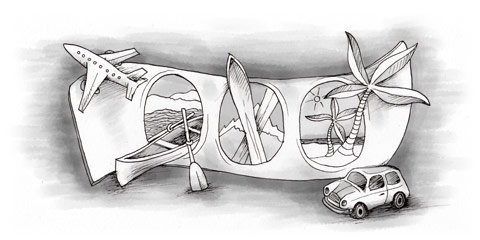Finding a car
Buying from a dealer or private individual comes with its own advantages and disadvantages. A private individual is more unlikely to accept a bank transfer however may offer you a cheaper price for the car. It is imperative that you bring a mechanic along to check the car before the purchase.
Foreign currency, notably US dollars are unlikely to be accepted by dealers or private sellers.
To start off your search it is worth checking online for sites advertising cars such as Chile Autos and Viva Street . In Santiago there is a dealership which specialises in getting things sorted for foreigners: Suzi Santiago . They can find the right car for you, deal with the paperwork and even buy it back of you at the end of your time in Chile.
Necessary paperwork
When buying your car in Chile it is imperative the seller can provide you with paperwork for a smooth transaction:
- Seguro Obligatorio (Compulsory Third Party Insurance) for your vehicle should be paid in advance and valid for one year.
- Permiso de circulación (registration certificate) needs to be presented to you in order to prove that the road tax in Chile has been paid.
- A revision técnica (Chilean car inspection) must be carried out every year to assess if it is roadworthy. You will need to know when the last time the inspection was carried out and make sure a revision has been scheduled before the year has passed.
- Padron, the motor vehicle registration record or registro nacional de vehículos motorizados is a document that shows the cars details and the identification of the owner.
- A certificate called certificado de anotaciones para vehículos motorizados will show you if there are any violations or restrictions on the car. This is an important document as if there are any violations present, they become your responsibility once the purchase has been made.
Additionally, you will need to get a RUT (Rol Único Tributario) number. For a detailed description on how to obtain a RUT, have a look at this article .
The purchase and transfer process
You will need to find a notary and explain your wish to purchase the car. In return, they will calculate the tax needed to be paid on the vehicle. This is normally around 1.5% of the total market value and will need to be paid at your local bank.
The purchasing contract should be sent to the nearest car registration office known as Registro Civil with your RUT certificate and number, as well as your passport. The motor vehicle registration record or registro nacional de vehículos motorizado should be given into the office as well.
You will instantly be issued with a temporary certificate stating your ownership of the car. Your official motor vehicle registration record should be set to you within 3 weeks.

